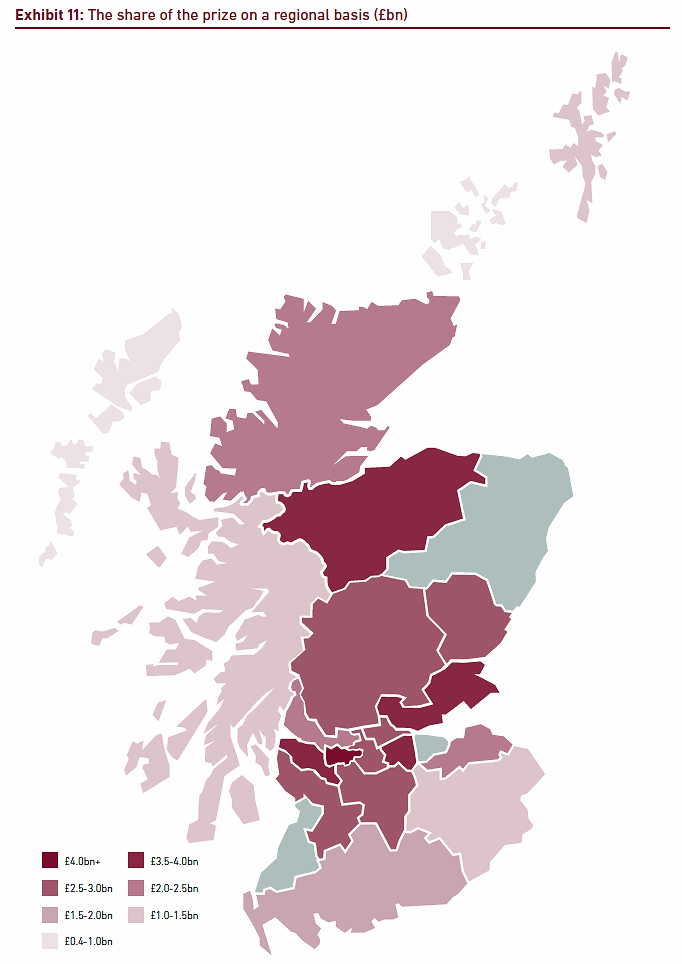Better Broadband and Mobile Could Help Boost Scotland’s Economy by £25bn
The Confederation of British Industry (CBI) has today published a new report, which claims that faster and more reliable broadband and mobile connectivity are two of several key factors that could help to deliver a £25 billion boost to the Scottish economy by 2024.
The analysis found that the most productive local authority areas (LA) in Scotland (i.e. Aberdeen City and Aberdeenshire) are 50% more productive than the least productive (Shetland Islands). CBI Scotland then calculated what the economic impact would be by 2024 if each local area were to improve at the same rate as the top performer, before explaining how this could actually be achieved.
CBI Scotland’s baseline scenario (i.e. productivity for each LA continues to grow at roughly the same pace as it did between 2004 to 2014) results in Scotland’s nominal gross value added (GVA) rising 32% to £163.62bn by 2024. However if each LA grew at the same pace as the top performers then the nominal GVA of the Scottish economy would climb 53% to £188.55bn by 2024.
Advertisement
Sadly this is a very simplistic analysis and it fails to quantify precisely how much of that growth could come from improving digital connectivity beyond existing levels, which is a very difficult thing to get right. Nevertheless the report proceeds to recommend improvements in broadband and mobile connectivity.
CBI Report Extract – Broadband
Digital connectivity is part of our critical national infrastructure and ensuring that Scotland’s digital infrastructure meets business’ needs of tomorrow will be crucial to lifting productivity. Previous CBI research shows 91% of firms rank digital networks as a key factor in investment decisions.
CBI Scotland welcomes the Scottish government’s commitment to ensure that every business and residential premise in Scotland is able to access superfast broadband by 2021. Achieving this ambitious target will require continued public and private partnership.
However, reliability, as well as speed, of connection is vital to businesses across the country, many of whom often need to connect with others internationally. This came out as a key concern in our consultation with members, with a number of businesses having experienced reliability issues at busy times of the day.
Businesses are also increasingly reliant on the ability to work on the move. However, mobile coverage on many roads in Scotland is poor, falling below the UK average. Increasing the availability and improving the reliability of broadband coverage on public transport would help to reduce productivity loss during travel.
CBI Scotland continues to call for digital connectivity to be integrated into all future infrastructure planning and development decisions.
At present the £428m Digital Scotland project with BT (Openreach) has already ensured that “superfast broadband” (30Mbps+) are able to cover “more than” 90% of the country and the existing contract expects to push this “high speed fibre broadband” (FTTC/P) network out to cover 95% of premises by the end of March 2018, which drops to 86% by the end of 2017 if you only look at the rural Highland and Islands region (here).
However the SNP dominated Scottish Government are currently working to develop a plan that will extend “superfast broadband” coverage to 100% of premises by 2021 (here) and today’s report welcomes that move, while also proposing a series of recommendations for harnessing digital connectivity in order to improve growth.
Recommendations
For the Scottish government
• Prioritise the completion of existing transport infrastructure commitments on time and continue to improve connectivity between Scotland’s City Deal Regions and with our key markets across the UK.
• Ensure decisions on future infrastructure investment are influenced by the potential economic impact of reducing journey times within local areas, which can lift productivity by giving businesses access to a greater pool of skills and talent.
• Pursue the reduction and eventual abolition of Scottish Air Passenger Duty to give Scotland an edge in the global marketplace for investment, tourism and trade.
• Ensure digital connectivity is integrated into all future infrastructure planning and development decisions.
• Work with the private sector and provide the funding necessary to deliver its commitment of ensuring that every business in Scotland is able to access superfast broadband by 2021.
• Increase the availability and improve the reliability of broadband coverage on public transport to help reduce productivity loss during travel.
For business
• Engage early with the Scottish government to help identify the next generation of priority infrastructure projects that would deliver maximum benefit to the economy.
Here’s a map of how each LA would fair if the performance of each was to match the top performing regions over the next decade.
Advertisement

Mark is a professional technology writer, IT consultant and computer engineer from Dorset (England), he also founded ISPreview in 1999 and enjoys analysing the latest telecoms and broadband developments. Find me on X (Twitter), Mastodon, Facebook, BlueSky, Threads.net and Linkedin.
« Delayed Again – Virgin Media’s Shifting IPv6 Adoption Goalposts

















































Comments are closed